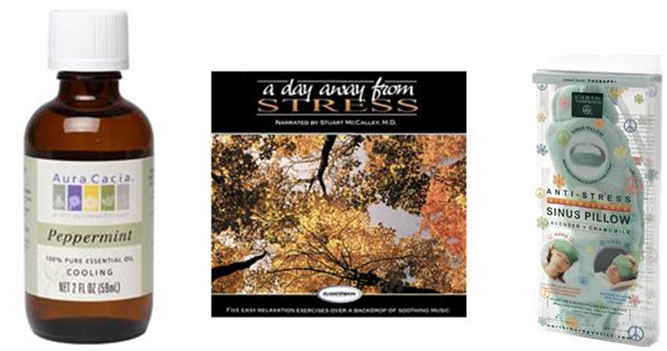Save 25% On Your First Autoship Order
Save 25% On Your First Autoship Order

It would be nice if we could go through life without feeling the negative effects of stress. Unfortunately we don’t live in this world. Many outside factors can impact our everyday life and cause stress. It is this stress that is our body and mind’s way of dealing with the events (positive and negative) that impacts us. These reactions can be both biological and psychological in nature and finding a way to manage stress can minimize the negative effects. We here at HPFY can give you some tips to manage stress.
Yeah, we have all been stressed at one time or another, but what is the true definition of stress? Stress can be defined as a subjective response by the body caused by a particular situation. Being subjective means that what might be stressful to someone may not be a stressor for someone else. Stress is our body’s way of preparing to face danger and stress can manifest itself in both physical and psychological ways, therefore affecting our behavior. Not all forms of stress are negative. Sometimes stress can help you meet a deadline or react quickly in an emergency situation. As with many other things, there are several types of stress and they can include:
Yes, not all stress is bad and can even help in situations of crises or in the face of the deadline. Often these chaotic situations can trigger the “fight or flight” response we have all heard of. This is a normal response by our body to stress, but should be temporary. Once the situation has dissipated, our heart rate should return to normal and return our bodies to their normal everyday state. Unfortunately, these physiological responses can take their toll on our bodies and overall mental well-being.

Since it is nearly impossible to eliminate stress from our everyday lives, it is imperative to learn how to cope with and manage stress. Sounds easy, right? Unfortunately, this may not be case for everyone. Some people are better than others in dealing with stressful situations. The question is: how do they do it? Of course, the first step is trying to avoid any potential stressful situation and as you can imagine that can be difficult, if not impossible. The CDC (Centers for Disease Control and Prevention) suggests several steps for managing stress. These are:

Managing stress can incorporate numerous behavioral and even environmental steps. By being proactive you can minimize the effects of stress on your everyday life. Besides the techniques above, we here at HPFY can offer some aids to help you manage stress. Some of these are:
You can’t avoid stress totally, but minimizing your exposure is a great step towards managing stress. When stress is unavoidable, finding the proper tools for managing your stress can go a long way being able to keep stress from impacting you negatively.
Disclaimer: All content found on our website, including images, videos, infographics and text were created solely for informational purposes. Our content should never be used for the purpose of diagnosis or treatment of any medical conditions. Content shared on our websites is not meant to be used as a substitute for advice from a certified medical professional. Reliance on the information provided on our website as a basis for patient treatment is solely at your own risk. We urge all our customers to always consult a physician or a certified medical professional before trying or using a new medical product.

Kevin Cleary has been a Health Products For You contributor for many years and has a degree in marketing. His health and wellness journey has a very personal meaning and has guided him in his content writing for HPFY.
In 2006, ...
How To Increase Iron Levels Quickly
It’s a question that must have puzzled you like many others. Iron is essential in hemoglobin production and its inadequate levels can negatively impact your health. Dive into this informative article to explore top iron-rich foods that can help you fight iron deficiency.
10 Best Coccyx Cushions for Tailbone Pain
If you're like most people, you spend about 8 to 10 hours sitting every day. However unhealthy, it is part of life for many, and can cause tailbone pain. Coccyx cushions can help alleviate this pain. Click to read more and find the perfect coccyx cushion for your tailbone pain.
5+ Best Adult Diapers for Fecal Incontinence
Dealing with fecal incontinence can be challenging, but you're not alone. Read this article and navigate through discreet and effective solutions that help you manage fecal incontinence and let you live life on your terms with confidence and comfort.
Top 5 Best Reviewed Nebulizers of 2024
Need an effective and affordable nebulizer? Look no further, in this article we offer 5 of our best reviewed nebulizers that are loved by our customers. Click to read more and find the perfect nebulizer for all your respiratory needs.
10 Best Penis Pumps For Erectile Dysfunction
For anyone dealing with erectile dysfunction, penis pumps serve as a great way to manage it. But with so many products available, determining the best one for your needs can be challenging. To assist you in refining your choices and making an informed decision, here are our top 10 options, recognized for their effectiveness and safety.